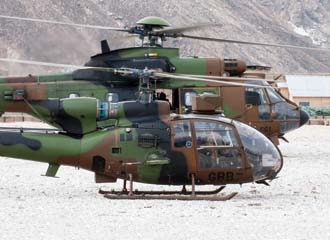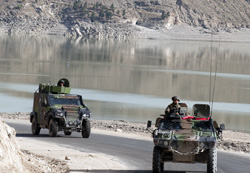Eurocorps Seeks to Pioneer Coalition Interoperability
The future of coalition operations may be unfolding within a NATO command in Afghanistan. The Eurocorps, a multinational corps that is barely two decades old, is focusing on building a capability that will allow a coalition force to respond rapidly to urgent operational needs.
 |
|
A pair of French helicopters prepares to take off from a forward operating base in Afghanistan. The Eurocorps is looking to lead the way to developing a rapid deployment capability that can configure multinational units into a coherent force that can operate across national lines. |
The multinational command strives to lead joint operations into the future.
The future of coalition operations may be unfolding within a NATO command in Afghanistan. The Eurocorps, a multinational corps that is barely two decades old, is focusing on building a capability that will allow a coalition force to respond rapidly to urgent operational needs.
What began as a tool for political reconciliation between Germany and France in 1992 now has grown into a multinational rapid deployment force that is a more specialized version of NATO. It serves both the Atlantic alliance and the European Union, and it faces many of the cultural and technical challenges common to both organizations.
As with all multinational forces, the Eurocorps’ coalition effort entails ensuring interoperability among different militaries. But it also includes being able to tap the expertise and resources of various member nations rapidly and efficiently. And, the Eurocorps is reaching outside of its traditional member wellspring to welcome new partners, including non-European NATO stalwarts such as the United States.
Lt. Gen. Olivier de Bavinchove, FRA, is the commander of the Eurocorps. He also serves as the chief of staff for the International Security Assistance Force, or ISAF, in Afghanistan. “From the very beginning, the Eurocorps has been one of the most efficient NATO tools employed—and deployed—in real operations,” the general declares.
The Eurocorps is organized like a NATO headquarters, following the same rules as all the nations within NATO. Memoranda of understanding (MOUs) have established the Eurocorps as an operational three-star headquarters in NATO deployments. It has been deployed in several operations, including Kosovo and several tours in Afghanistan.
With the Eurocorps serving as part of the NATO command structure, it is expecting substantive changes as the alliance command structure transforms. The general explains that the Eurocorps continues to follow NATO rules and procedures for training and operational preparation.
“Since the very beginning, nations have equipped the Eurocorps with human resources and technical assets to be able to deploy joint expertise in a land environment,” Gen. de Bavinchove relates. Currently, he has a team of about two dozen air and naval officers that help provide expertise for potential operations in which the corps could be used as a leading force in a joint effort.
The Eurocorps faces many of the issues that challenge larger alliances and coalitions such as NATO. Yet, with its smaller size and more directed mission, it can serve as an operational testbed for the Atlantic alliance for future coalition operations. The Eurocorps faces those issues within a more focused structure.
At its core, it is striving to implement a joint concept as soon as possible. “We are prepared to do it; we have been prepared to do it since the very beginning; but we are prepared to do it because we have been involved ably in all of the NATO studies regarding the implementation of this [joint] concept,” Gen. de Bavinchove declares. “It is challenging because it requires new expertise and new organizations within the Eurocorps.”
He continues that this goal also requires new equipment and technologies, particularly for leading amphibious or maritime operations. And, the use of special forces likely will play a role in future Eurocorps actions.
So, the Eurocorps is aiming to be fully operational in a joint milieu within four years. This would enable it to lead joint operations comprising as many as 50,000 troops, if needed.
“We believe that all coming operations will be joint with many countries,” the general states. “So, we have to prepare during peacetime to be ready for any operation—wherever and whenever it happens.”
The Eurocorps currently comprises five framework nations: France and Germany, which founded the group; along with Spain, Belgium and Luxembourg. Associate nations include Greece, Turkey, Italy and Poland. Austria had been an associate member of the corps beginning in 2002, but it left in 2011.
In December 2011, Poland signed an agreement to become the newest framework nation. With this designation, Poland will join the Eurocorps’ rotating command architecture and provide additional officers to all areas of the Eurocorps. Gen. de Bavinchove acknowledges that the Eurocorps maintains relations with some non-NATO nations, but it prefers to concentrate on relations with NATO members and its framework nations.
One of these NATO members that may become an associate member of the Eurocorps is the United States. Gen. de Bavinchove points out that this associate membership has been negotiated with and approved by the U.S. government. U.S. officials may fill key Eurocorps positions in sectors such as G-5, G-9 and possibly G-2 and G-7. The general admits that some administrative problems, such as rules that will be applied to these U.S. officials, remain to be ameliorated. However, he is confident that these hurdles will be overcome and the way will be clear for U.S. officials to join the Eurocorps structure.
Primarily a ground force, the Eurocorps depends on the assets of individual nations to support a deployed operation. This effort begins with expertise within headquarters, Gen. de Bavinchove explains, as each nation brings various specializations to the table. For equipment, the framework nations will provide the necessary support. The general says that individual capabilities will come from individual nations, although training and deployment assets might be provided by more than one nation.
The general expects the Eurocorps to create a cell for strategic airlift. However, he emphasizes that this cell would provide a link between the Eurocorps and individual nations’ strategic airlift, not an air command. This approach reflects an underlying tenet of the Eurocorps.
 |
|
A French light armored vehicle and a small protected vehicle move cautiously along an Afghan road. Eurocorps activities as part of the International Security Assistance Force are providing valuable lessons in its evolution into a joint coherent force. |
“We need to be realistic and modest in our ambitions,” Gen. de Bavinchove states. “Our ambition is to be fully operational, but we don’t need all this expertise on a permanent basis. We need mainly to be able to create a link with the key elements provided to us by nations, in case of an operational deployment—as it has been done for long deployments over the past 20 years.
“We don’t have all the capabilities within the Eurocorps, but when we have been deployed … support was provided to us by nations,” he continues. “It is a very efficient approach; it is not expensive. We are not going to create some resident capabilities that are already available through nations. We are only asking to create a link to engage these critical capabilities when we are deployed.”
In addition to strategic airlift, the Eurocorps seeks the same linkage for maritime and amphibious capabilities. Gen. de Bavinchove adds that the Eurocorps also needs linkage with technological and communications assets for maritime and amphibious operations, as well as for special forces. The Eurocorps can link with NATO assets, such as the alliance’s airborne warning and control system (AWACS) fleet of aircraft.
These needs come back to the land mindset that has accompanied the Eurocorps virtually since its founding. The general emphasizes that the Eurocorps’ direction forward entails abandoning that land mindset in favor of a joint mindset.
He suggests that one of the reasons that the Eurocorps is an easy adopter of a comprehensive approach is that it is based in Strasbourg, France. Strasbourg is the home of the European Parliament, which engages 27 nations and hosts many international embassies and consulates. Being in this political environment and its support infrastructure, which includes academia, has helped the Eurocorps institute the comprehensive approach. Many of these support organizations actually are embedded in the Eurocorps, he notes.
“It is our mission to work together. It is not only our ambition, it not only is possible to do it, it also is very operational. It has been demonstrated by the operational deployment of the Eurocorps in many challenging operations,” Gen. de Bavinchove warrants.
The general states that this comprehensive approach is absolutely critical for operational success. “We are committed to doing it together, and we have a real added value by engaging many officers, NCOs [noncommissioned officers] and soldiers from other nations,” he says, adding that the effectiveness of this approach is being demonstrated in ISAF on a daily basis.
Gen. de Bavinchove believes that, within a few years, the Eurocorps will be fully joint, ready to be deployed, ready to take the lead in complex multinational operations, and ready to implement all measures characteristic of joint and comprehensive approaches. That capability not only will be more effective in military operations, it also will be a less expensive approach than having one nation bear the entire burden.
“We are in a huge financial crisis—not only in Europe, but also in the world—and the Eurocorps is an operational tool that has been, and still is, deployed in operations,” the general affirms. “But, it is less expensive for all nations, and less expense will be a critical factor for the near future.”
“We have been fully committed in Europe, and sometimes some mistakes were made regarding what we do think about defense,” the general allows. “I am looking forward to the arrival of the United States within the Eurocorps, because I do believe that this close relationship between the United States and the Eurocorps will create confidence and trust in our capability to work together.”
As with any multinational military organization, interoperability is an issue that must be addressed. As the chief of staff of ISAF, Gen. de Bavinchove says that interoperability is an issue each day with many ISAF forces originating from nations outside of NATO. Within the Eurocorps, interoperability is more easily addressed than within the broader ISAF. “We have been quite successful at implementing interoperability within the Eurocorps,” the general states.
One key enabler is the use of the English language among officers. This serves as the basis for staff operations and deployments, and Gen. de Bavinchove says it has helped create a single cooperative environment as a first step. This is leading to more interoperable processes and intelligence sharing.
Hardware interoperability within the Eurocorps builds on NATO efforts. Alliance Eurocorps members are using the same equipment as they use in NATO, and this gives them full access to information through standardized networks. For intelligence sharing, an MOU outlines how nations collect and share intelligence to create a G-2 environment for exercises and deployments. The general explains that NATO technical teams assist and ensure that the Eurocorps follows the same rules as the alliance in this effort.
“From my ISAF perspective, our G-2 intelligence branch is a real fusion center,” Gen. de Bavinchove declares. “It has been very well-organized to collect intelligence from many nations in Europe. Because of this intelligence-sharing venue, we probably are a very efficient corps.
“It is always better when you can create an environment in which you collect intelligence from [different countries], and then you evaluate this intelligence and you create an information sharing intelligence center in which you address precisely the issues regarding operational deployment or training exercises,” the general emphasizes.
“It’s never easy to share with others,” he continues. “It’s always much easier to work alone. But, we all know that if we are not able to share, if we are not able to take into consideration concerns from other nations, then we will fail.”
WEB RESOURCES
Eurocorps: www.eurocorps.org
ISAF: www.isaf.nato.int



Comments